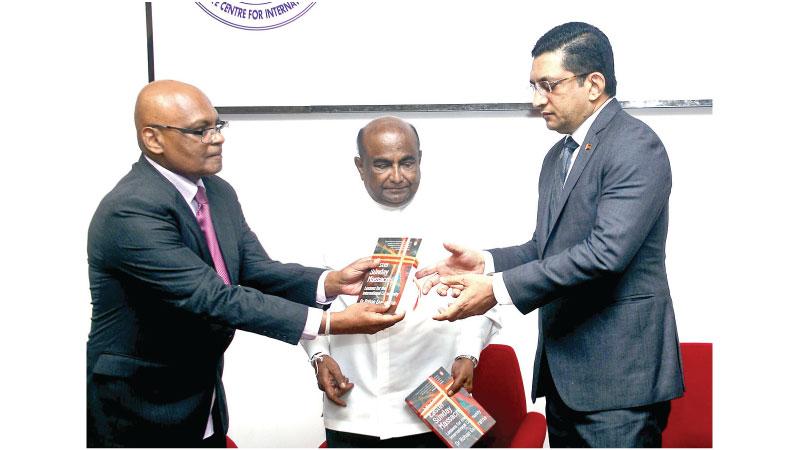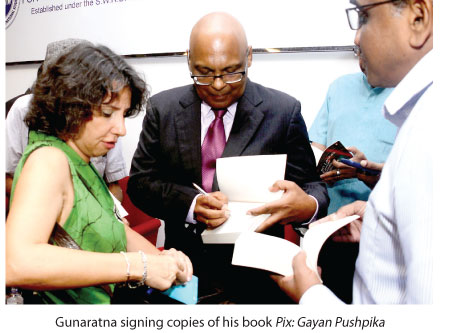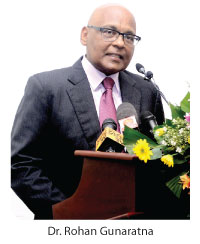
In his book, “Sri Lanka’s Easter Sunday Massacre: Lessons for the International Community,” terrorism expert Dr. Rohan Gunaratna sheds light on the urgent need for de-radicalisation as a crucial step in countering terrorism.
The book was launched on July 28 at the BMICH with Foreign Minister Ali Sabry and Speaker Mahinda Yapa Abeywardena in attendance.
 Gunarathna’s book delves into the harrowing events of the April 21, 2019 Easter Sunday suicide bombings which claimed over 200 lives in Colombo and other parts of the country.
Gunarathna’s book delves into the harrowing events of the April 21, 2019 Easter Sunday suicide bombings which claimed over 200 lives in Colombo and other parts of the country.
As a prominent scholar in security studies and an expert on international terror, Dr. Gunaratna highlights that Islamic extremism is deeply rooted in Wahabism or Salafism, which has been rapidly disseminating its ideology worldwide through modern communication channels.
To effectively combat this menace, the renowned expert contends that addressing its ideological underpinnings is paramount along with community-based de-radicalisation. In the absence of a robust legal and policy framework to combat radicalisation and promote moderation, tolerance, and coexistence, Sri Lanka remains vulnerable to potential future attacks, Dr. Gunaratna says and warns that the lack of preventive measures may lead to similar incidents in the future. Dr. Gunaratna said the need for governments to move beyond merely apprehending perpetrators after attacks and focus on proactive measures to prevent and pre-empt terrorist activities. Building and maintaining capabilities within the military, law enforcement, and intelligence agencies are vital components of this preventive approach.
Confrontational politics
For a successful de-radicalisation process, Sri Lanka must unite in developing a common approach by transcending confrontational politics and forging a consensus on national security objectives. Dr. Gunaratna underscores that the key to security lies in achieving social and religious coexistence, and therefore, partisan divisions should not infiltrate these critical matters.
 His research and expertise calls for urgent action in tackling the roots of Islamic terrorism to secure a peaceful and harmonious future for Sri Lanka and the broader international community.
His research and expertise calls for urgent action in tackling the roots of Islamic terrorism to secure a peaceful and harmonious future for Sri Lanka and the broader international community.
As the world grapples with the pervasive threat of terrorism, Dr. Gunaratna’s insights provide valuable guidance in countering extremism and promoting global peace.
Speaking at the launch event Foreign Minister Ali Sabry said that the Muslim community was first concerned about the book but assured that Dr. Gunaratna is far from Islamophobic and had worked hard to reverse the cremation policy that was applied for Muslims during the Covid-19 pandemic in 2020.
At the focal point of the launch event, Dr. Gunaratna showed the audience a never-seen-before video of Zaharan Hasheem, the radical cleric who led the Easter Sunday bombings, and his terror cell.
In the chilling video Zaharan encourages Muslims to take up arms against the Kafirs (infidels) and fight them until an Islamic caliphate is established in the region of al-Sham (consisting of modern day Lebanon, Syria, Jordan, Israel and Cyprus).
Achieving martyrdom
Zaharan also stresses that it is the duty of every Muslim to oppose non-Muslims and that the lives of Kafirs and their property can be taken according to divine law while justifying the use of suicide attack as a means of achieving martyrdom.
In the video, Zaharan doesn’t show any form of anxiety given the task at hand. He warns non-Muslims that more attacks are coming which are a form of retribution against attacks on Muslims in other parts of the world.
 Zaharan specifically mentions Islamophobic incidents in the West and bombing of ISIS by coalition forces as attacks on the Muslim world. The video ends after Zaharan and his followers pledge allegiance to Abu Bakr Al Badhdadi, the leader of ISIS during that time.
Zaharan specifically mentions Islamophobic incidents in the West and bombing of ISIS by coalition forces as attacks on the Muslim world. The video ends after Zaharan and his followers pledge allegiance to Abu Bakr Al Badhdadi, the leader of ISIS during that time.
During his presentation Dr. Gunaratna disapproved delisting Islamist organisations that had previously been banned after the Easter Sunday blasts. Re-emphasising the need for a community-based approach in countering terror, he recalled how Zaharan’s wife Hadiya testified that the cleric had a hard time recruiting Muslims because they were loyal to the country and that Zaharan was also at logger-heads with Islamic scholars in Sri Lanka.
He also clarified that extremism in Sri Lanka was always fostered by outside forces and was never ‘home-grown’ as in Zaharan who was radicalised by overseas preachers.
Dr. Gunaratna said that terrorism comes in many shapes and forms and gave examples of Buddhist extremism in Myanmar and Christian extremism as in the case of the Christchurch Mosque shooter in New Zealand.
Illustrating his point, Dr. Gunaratna spoke of Mohamad Thaslim, who blew the whistle on Zaharan’s activities before the April 2019 attacks and was instrumental in helping the CID locate Zaharan’s Jihadist training camp in Wanathawillu.
If the camp wasn’t found, it could have led to attacks around the island, Dr. Gunaratna said. Thaslim was later shot in the head in March 2019 by Zaharan’s armed wing and was scarred for life. Thaslim was in attendance at the book launch and was introduced to the audience alongside a Sri Lankan-American who lost her son in the Cinnamon Grand Bombing.
Countering extremism
In a world grappling with the pervasive threat of terrorism, Dr. Gunaratna’s insights offer valuable guidance in countering extremism and fostering global peace. His call for urgent action resonates as a reminder that concerted efforts are required to secure a peaceful and harmonious future for Sri Lanka and the broader international community.
